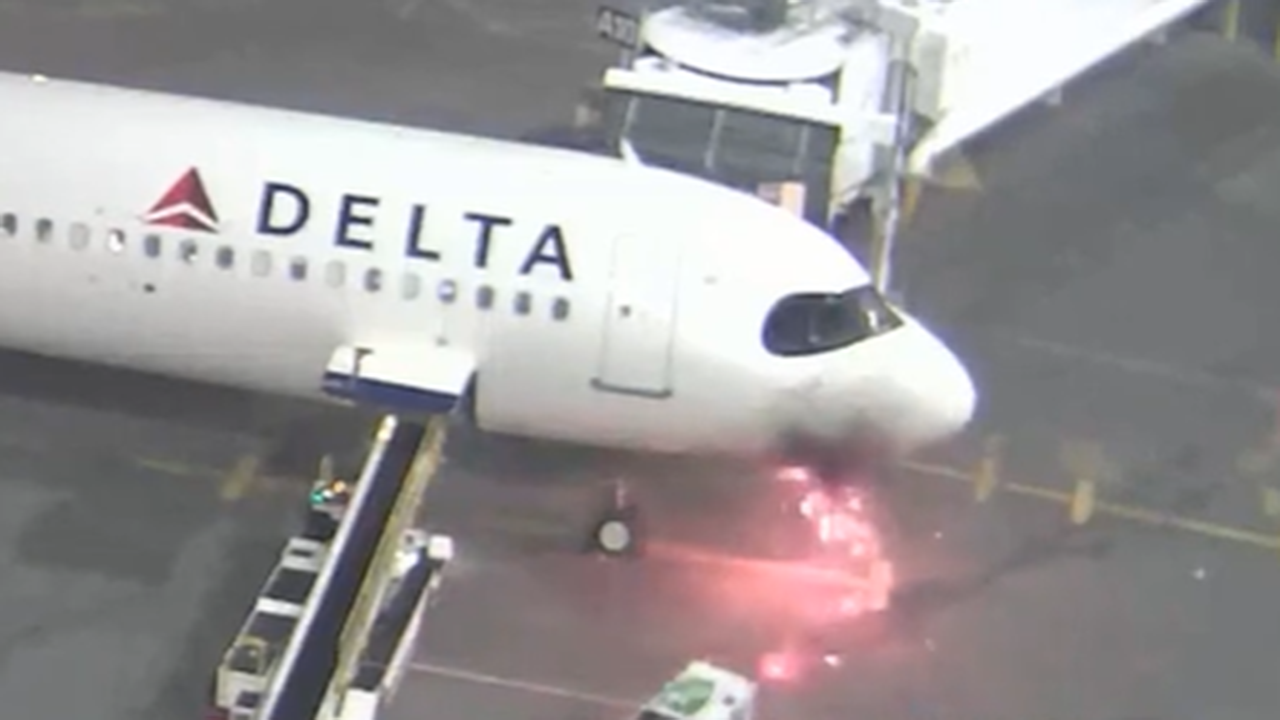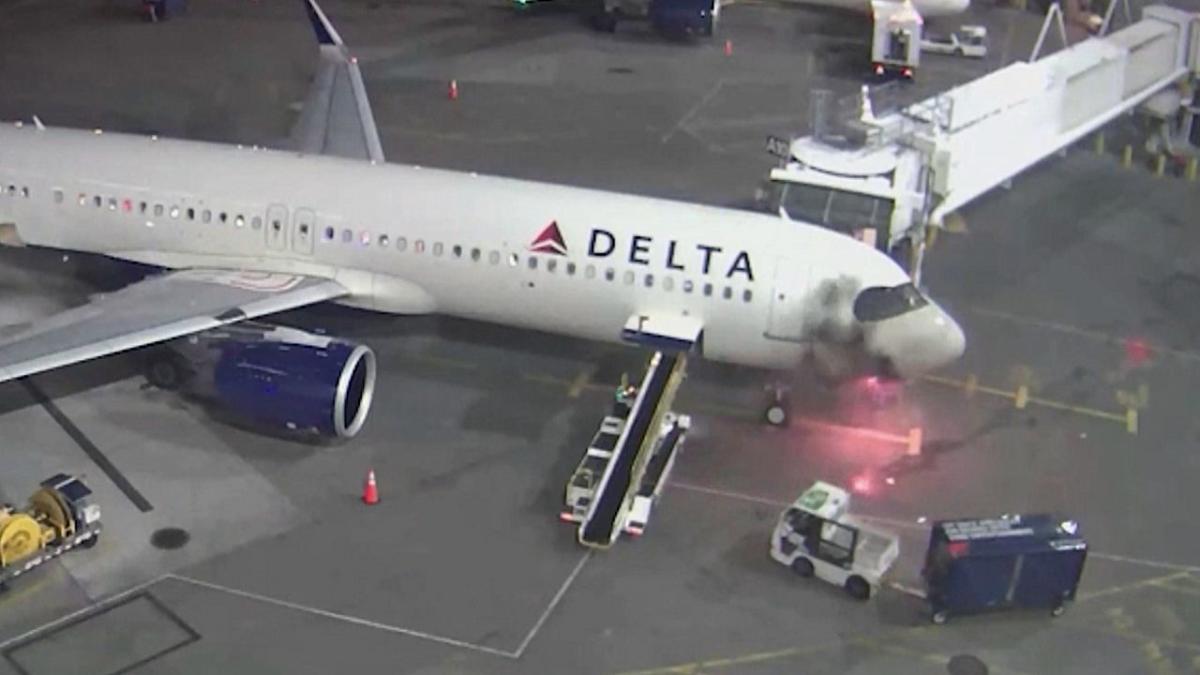Incident Overview
Delta plane catches fire seattle – On July 13, 2023, a Delta Air Lines Boeing 737-900ER aircraft caught fire while parked at Seattle-Tacoma International Airport (SEA). The incident occurred around 10:30 AM local time, with multiple witnesses reporting seeing flames and smoke coming from the plane.
The fire was contained to the aircraft’s left engine, causing significant damage to the engine and surrounding areas. No injuries were reported, and all passengers and crew were safely evacuated from the plane.
Cause of the Fire
The National Transportation Safety Board (NTSB) is currently investigating the cause of the fire. Initial reports suggest that the fire may have been caused by a maintenance issue related to the aircraft’s engine.
Cause of the Fire: Delta Plane Catches Fire Seattle
Determining the exact cause of an aircraft fire can be a complex and time-consuming process, involving multiple investigations and analyses. The investigation into the Delta plane fire in Seattle is ongoing, but several potential causes are being considered.
One of the most common causes of aircraft fires is electrical malfunctions. These can occur due to faulty wiring, damaged components, or overheating. Another potential cause is a fuel leak, which can lead to a fire if it comes into contact with a heat source. Mechanical failures, such as a malfunctioning engine or landing gear, can also generate sparks or heat that could ignite a fire.
Investigation Process
The investigation into the Delta plane fire will involve a thorough examination of the aircraft’s wreckage, including the electrical systems, fuel lines, and mechanical components. Investigators will also review maintenance records and interview witnesses to gather information about the events leading up to the fire.
The investigation may also involve testing and simulations to recreate the conditions that led to the fire. This can help investigators to identify the specific cause of the fire and develop recommendations to prevent similar incidents in the future.
Findings and Theories, Delta plane catches fire seattle
The investigation into the Delta plane fire is still ongoing, and no official findings have been released. However, several theories have been put forward regarding the possible cause of the fire.
- One theory is that the fire was caused by an electrical malfunction in the aircraft’s wiring.
- Another theory is that the fire was caused by a fuel leak, which ignited when it came into contact with a heat source.
- A third theory is that the fire was caused by a mechanical failure, such as a malfunctioning engine or landing gear.
The investigation is expected to continue for several months, and the final report may not be released for some time. However, the findings of the investigation will be critical in helping to prevent similar incidents in the future.
Safety Measures and Response
Delta Air Lines prioritizes the safety of its passengers and crew, implementing comprehensive safety measures and emergency response protocols. These measures aim to minimize the risks associated with air travel and ensure a prompt and effective response to any incidents.
Delta planes are equipped with state-of-the-art safety features, including advanced fire detection and suppression systems. The planes undergo rigorous inspections and maintenance to ensure their airworthiness. Additionally, Delta’s pilots and cabin crew receive extensive training in emergency procedures and regularly participate in drills to enhance their preparedness.
Emergency Response Protocols
In the event of an incident, Delta’s emergency response protocols are swiftly activated. The crew follows established procedures to alert the ground control, evacuate passengers, and contain the situation. Passengers are instructed on emergency procedures during pre-flight briefings, and cabin crew members assist in ensuring a safe and orderly evacuation.
Delta collaborates closely with local emergency services, such as fire departments and medical teams, to provide immediate assistance. The airline’s dedicated emergency response team coordinates with authorities to manage the incident and provide support to affected passengers and their families.
Effectiveness and Areas for Improvement
Delta’s safety measures and emergency response protocols have proven effective in mitigating risks and ensuring passenger safety. However, the airline continuously evaluates its procedures and seeks opportunities for improvement. Regular reviews and updates are conducted to enhance the effectiveness of safety measures and emergency response protocols, incorporating lessons learned from past incidents.
Areas for improvement may include enhancing communication systems to facilitate real-time coordination between crew members and ground control, providing additional training to cabin crew on managing complex emergencies, and exploring technological advancements to further enhance fire detection and suppression capabilities.
Impact and Aftermath

The Delta plane fire in Seattle had a significant impact on the airline industry and prompted a review of safety measures and regulations.
In the aftermath of the incident, the National Transportation Safety Board (NTSB) conducted a thorough investigation to determine the cause of the fire and make recommendations for preventing similar incidents in the future.
Impact on the Delta Plane Industry
The fire caused extensive damage to the Delta plane, resulting in its grounding and subsequent retirement. The incident also led to flight delays and cancellations, disrupting travel plans for passengers and causing financial losses for the airline.
Changes and Regulations Implemented
As a result of the incident, the Federal Aviation Administration (FAA) implemented several new regulations and safety measures, including:
- Increased inspections of aircraft wiring and electrical systems
- Improved training for pilots and maintenance personnel on fire prevention and response
- Requirement for airlines to install fire suppression systems in cargo holds
Lessons Learned and Recommendations for Future Safety Measures
The Delta plane fire highlighted the importance of proactive safety measures and regular maintenance to prevent and mitigate aircraft fires.
The NTSB recommended that airlines and aircraft manufacturers:
- Enhance fire detection and suppression systems
- Improve communication and coordination between pilots and maintenance personnel
- Conduct regular risk assessments and implement mitigation strategies
